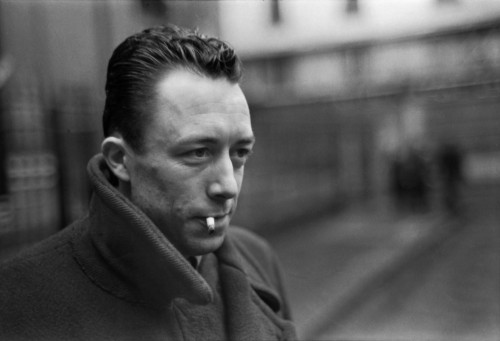What is one person or a family to do?
To begin go big I think. First, set an all-encompassing ethical boundary.
In The Rebel Albert Camus said that we can be neither victims nor executioners – we must reject murder and all its associates, torture especially, as a tool of the State, of any State, but especially of our United States. This does not mean thinking that pacifism is a personal or public alternative; Camus fought the Nazis in the French Resistance. The world remains stockpiled with those who wish to do us harm. Sometimes we must fight and kill. However, we can reject any politician or ideology that sees unrestrained violence as an acceptable response. We must not become that which we oppose. Nietzsche warned us: “Be careful when you fight the monsters, lest you become one.”

Camus in Paris
Next, accept that there is a ‘common good,’ an evolving moral, ethical and political common ground whereby men and women of good will can meet and forge compromises that give most of us opportunities to make better lives for ourselves and for children. Shelby Foote said that our peculiar American genius is found in our ability to compromise and that we are at our worst when this goes awry. Therefore, in the voting booth, reject any politician of either party who embraces ideological purity over practical solutions. Ideologues are one of the twin public poisons of our time, the other being a deeply selfish faith that the individual’s desires alone are always supreme.
These two maxims will not halt whatever tides of history now approach us. Knowing that, I sometimes daydream about supreme power. At their origin, such dreams are always childish. The child desires the world to revolve around him or her because that should be the natural order of life — I exist, therefore everything must please me. Of course, if an adult believes in such a mandate, we would do well to keep a wary eye upon him. He is at best delusional, and the history books are full of the worst that might be done by those like him. We should beware of anyone in power, corporate or governmental, whose certainty has devolved into self-righteousness and bullying threats.
Along with a humble religious faith, education can change lives for the better. Always striving to learn and staying curious opens perspectives and deepens a sense of wonder. Learn how to ‘see’ more and more. Drive and ambition should be encouraged. Self-reliance is more important than ever. We must never give in to despair — if nothing else stories like this one can sustain us: two days ago I met a young man, Ibrahim, an immigrant from Guinea, who survived life in a refugee camp and still carries red eyes from an infection he picked up there while bathing with polluted water. He learned English from cheap paperbacks and won a United Nations scholarship to study in the US. He completed his degree while working full time and is now in graduate school studying epidemiology and still holding a job down while he does so. Tell me that his journey does not give one hope.
We must try to behave in every way with a sense of decency and honor. We might feel as if we are bits of driftwood being thrown around by the sea, but we must still act as if what we do matters. It does matter – “each one does what he can.”* Our actions alone can strengthen individual lives and even sometimes mend them.
Walk, hobble, run, limp energetically or at least sit outside. The natural world waits as the second best antidote for the turmoil and racket of the artificial electronic world. Whatever we can do to preserve it is an inherently conservative act. Children to come should not be deprived of its restorative powers, of its transfiguring beauty.
The best antidote, as always, is the chance to love others – children, family, friends.
Each of us learned, often painfully, that we must engage the difficult, mesmerizing, ugly, heartbreakingly lovely world. There is no place to hide. We are in this up to our necks with all those other incalcuable lives.
*said by Robert Jordan from For Whom the Bell Tolls by Ernest Hemingway
I think that’s the “meaning” of the Hobbits in the Lord of the Rings … That just because as individuals we feel tiny in comparison to such big forces as corporations, Super-PACs, government agencies, global warming, etc., we shouldn’t discount the small good we can do.
(Tend your garden, someone once concluded.)
And I firmly believe that hope is one of those small, good things that we can cultivate, and that it’s not at all insignificant.
I really enjoy the tone of your posts, Mike. Thanks!